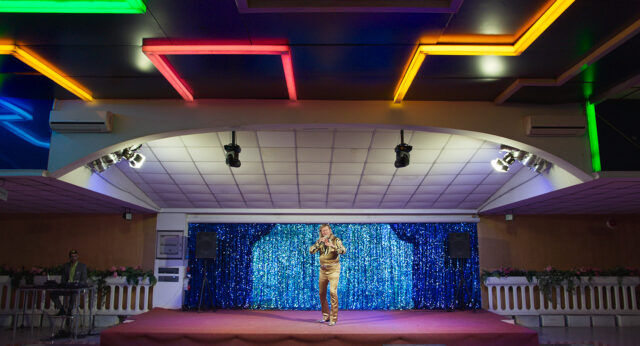
Richie Bravo (Michael Thomas) tries to hang on to his long-lost past in Ulrich Seidl’s Rimini
RIMINI (Ulrich Seidl, 2022)
Quad Cinema
34 West 13th St. between Fifth & Sixth Aves.
Opens Friday, March 17
212-255-224
quadcinema.com
Michael Thomas is unforgettable as washed-up Schlager singer Richie Bravo, an alcoholic haunted by his past, in Ulrich Seidl’s Rimini, opening March 17 at the Quad. In an early scene, he visits his brother, Ewald (Georg Friedrich), at their family home after the death of their mother and walks wistfully around the house, looking at old photos, gently brushing his hand over a piano, and playing Bata Illic’s “Schwarze Madonna” on the jukebox in the basement, dancing by himself and eventually singing along: “Every life has its woes / Happiness comes and goes / Black Madonna / Every day, every night / We will always be this happy / It’s not too late / Your future will be great / Black Madonna.”
Richie is a big, broad-shouldered man who moves with a swagger, slightly leaning to his right, his dirty blond hair in a ponytail, a wisp often falling over his face. After the funeral, he returns to his house in Rimini, Italy, a popular resort in the summer but it’s now winter, sparsely populated and covered in snow and mist. A large cutout of his younger self, when he was a star, hovers over his music room like a curse.
He is now relegated to performing in front of embarrassingly small groups of German-speaking tourists for peanuts, singing standards as well as new songs composed by Fritz Ostermayer and Herwig Zamernik. He can’t afford to hire a band, so he is accompanied by prerecorded music that is only one step removed from barroom karaoke. The dozen or two elderly fans who attend his shows adore him; he wanders through the audience, flirting with the women; following the shows, he sometimes sleeps with them for money, making more as a gigolo than as a musician. Seidl graphically depicts Richie having sex with them, particularly his ersatz girlfriend, Annie (Claudia Martini), whose dying mother (Rosa Schmidl) is in the next room. Richie is surrounded by approaching death; his father, Ekkehart (Hans-Michael Rehberg, who passed away shortly after filming), lives in a nursing home, barely able to move or speak.
Richie’s pathetic life is sent into turmoil when his daughter, Tessa (Tessa Göttlicher), suddenly shows up with her boyfriend, Moumen (Abd El Rahman), demanding the money Richie promised her and her mother when he left them eighteen years earlier, when Tessa was six. She is not asking for him to finally be a father to her; she just wants the cash and then to never see him again. But Richie is broke, and he doesn’t know how to show love and care anymore, so he is wracked with guilt, trying to find a way out of the miserable excuse of a life he has constructed for himself.
In addition to making fiction films, Seidl (the Paradise Trilogy, Dog Days) is an award-winning documentarian, and he, cinematographer Wolfgang Thaler, and art directors Andreas Donhauser and Renate Martin bring a realistic feel to the sad story, which Seidl wrote with longtime collaborator Veronika Franz. Rimini was written specifically for Thomas (Across the Mile, Randgänger), inspired by an event when, preparing to make the 2007 Import Export, Seidl watched as Thomas spontaneously sang “My Way” in a Ukraine restaurant. Resembling a bizarro, older Brad Pitt, Thomas gives a career performance as Richie, a train wreck of a human being who barely survives in the fragile bubble he has created for himself, buried in booze, cigarettes, and cheap sex to take away the pain of knowing what might have been, his ghostly eyes always somewhere else. He’s a bear of a man, wearing a faded fur coat as he stumbles past empty playgrounds and cabanas, passing by anonymous people dressed in black.
Göttlicher is terrific in her screen debut, channeling a young Claire Danes as Tessa tries to put together her own shattered life. And Rimini is a character to itself, its streets filled with emptiness and occasional random, unidentified figures. Seidl chose to film there not because it is Federico Fellini’s hometown but because his parents took the family to the seaside resort in the 1950s, although certain scenes have a Fellini-esque quality.
Seidl explores a different side of the story in his follow-up, Sparta, which was filmed at the same time as Rimini and focuses on Ewald, a work that has been mired in controversy surrounding allegations of on-set child exploitation that the director has denied. The two films have also been presented as the 205-minute Wicked Games: Rimini Sparta at festivals.